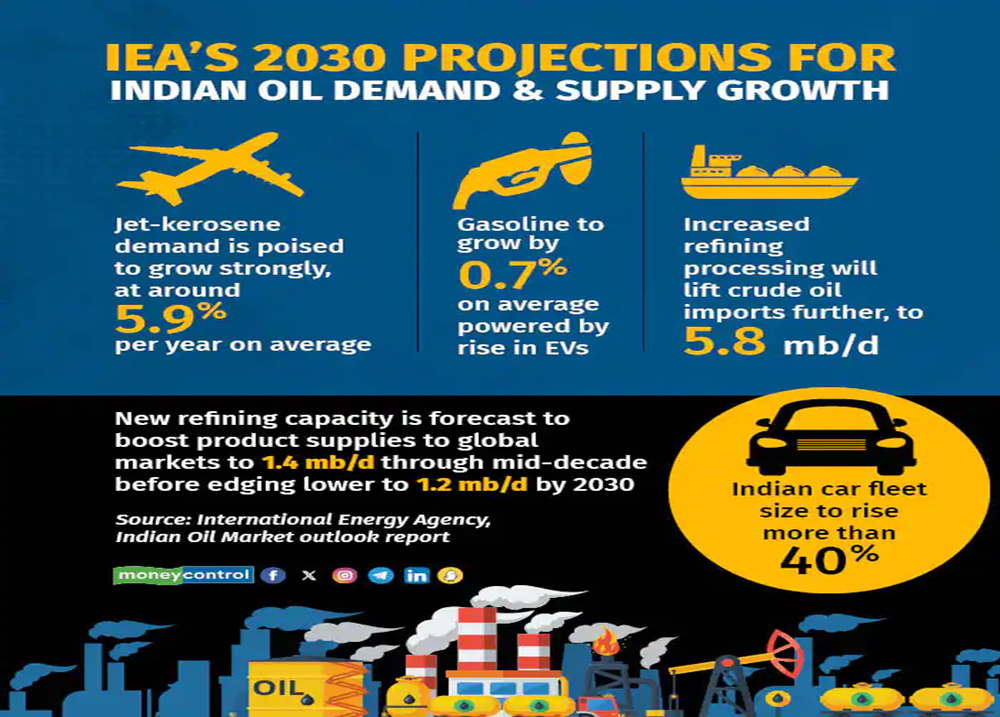INDIA TO INVITE GLOBAL BIDS TO TRADE IN ITS OIL RESERVES
Relevance
- GS Paper 2: International Relations
- Bilateral, regional, and global groupings and agreements involving India and/or affecting India’s interests.
- GS Paper 3: Economy
- Infrastructure: Energy, Ports, Roads, Airports, Railways, etc.
- Government policies and interventions for development in various sectors and issues arising out of their design and implementation.
Context
- India is set to move to the next phase of commercializing its oil reserves, with state-run Indian Strategic Petroleum Reserves Ltd (ISPRL) initiating discussions to invite global bids for trading in its oil reserves.
- This marks a significant step in leveraging India’s strategic oil reserves to enhance energy security and economic stability.
Current Status and Objectives
- Strategic Reserves: India’s estimated reserves of crude oil and petroleum products now cover 74 days of imports, including 5.33 million tonnes (mt) from both private and public companies.
- ISPRL’s Role: ISPRL, a subsidiary of the Oil Industry Development Board, is tasked with moving the reserves to commercial use and will soon conduct a feasibility survey for trading in its reserves.
- Union Cabinet Approval: In July 2021, the Union Cabinet allowed ISPRL to trade up to 20% of the reserves, initially permitting only Indian companies to participate.
- Commercial Strategy: The ISPRL is set to conduct a feasibility study and engage with global partners to maximize the strategic and economic benefits of trading in these reserves. This includes seeking strategic partners for the operationalization and management of the reserves.
Strategic Importance
- Energy Security: Enhancing the capacity and utilization of strategic petroleum reserves is crucial for India’s energy security. It ensures a buffer against global supply disruptions and price volatility.
- Economic Benefits: The commercial utilization of these reserves can generate revenue, optimize storage costs, and improve the overall efficiency of the reserve management system.
Infrastructure Development
- New Storage Facilities: ISPRL has already leased out storage capacities to entities like Hindustan Petroleum Corporation Ltd (HPCL) and is working on further expanding the storage infrastructure.
- Current Projects: The ongoing projects include the construction of additional underground storage at various locations, including Padur in Karnataka and Vizag in Andhra Pradesh. The new storage tanks and facilities are expected to be operational soon.
Industry Reactions
- The industry has shown keen interest in the commercial opportunities presented by ISPRL’s strategic move.
- However, certain aspects, such as the specific technology partnerships and detailed operational frameworks, are still under discussion.
- Queries from potential partners are being evaluated to ensure alignment with ISPRL’s strategic objectives.
Global Bids and Future Prospects
- Invitation for Bids:
- ISPRL will invite global bids to ensure a transparent and competitive process.
- The strategic partners will be selected based on their capability to contribute to the efficient management and utilization of the reserves.
- Global Engagement: By inviting global bids, India positions itself as a key player in the global oil market, potentially leading to increased foreign collaborations.
- Enhanced Storage: Plans to expand storage facilities align with the goal of securing longer-term energy supplies.
- Regulatory Framework: Ensuring robust regulatory mechanisms will be essential to manage the commercial use of oil reserves effectively.
- Long-Term Vision: The aim is to develop a robust and resilient oil reserve system that can support India’s long-term energy needs. This includes integrating advanced technologies and best practices from global partners.
Broader Implications
- Geopolitical Significance: India’s move to invite global bids for its oil reserves can enhance its strategic position in the global energy market. By partnering with international players, India can bolster its influence and negotiation power in energy diplomacy.
- Sustainability and Innovation: Engaging with global partners can bring in advanced technologies and sustainable practices in reserve management. This can help in reducing environmental impact and improving the efficiency of oil storage and usage.
- Economic Diversification: The revenue generated from commercializing oil reserves can be reinvested in other sectors of the economy. This can help in diversifying India’s economic base and reducing dependence on oil imports.
| Recent Data and Developments
Expansion Plans:
Parliamentary Review and Recommendations:
|
Conclusion
India’s decision to invite global bids for trading in its oil reserves marks a significant step towards energy security and economic optimization. By leveraging strategic partnerships and enhancing infrastructure, ISPRL aims to ensure the effective management of the country’s vital oil reserves. This initiative aligns with India’s broader goal of achieving energy independence and economic resilience in the face of global uncertainties.
Mains Question
Discuss the strategic significance of India’s move to invite global bids for trading in its oil reserves. How can this initiative enhance India’s energy security and economic resilience? (250 words)
References
- Parliamentary Committee Review on India’s Crude Oil Import Policy, December 2023.
Source: Live mint




